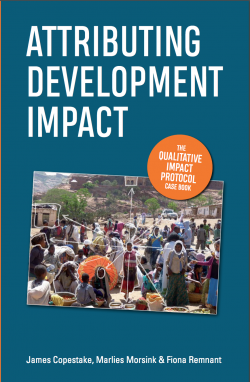 The Centre for Development Studies and Bath SDR have authored a book with Practical Action Publishing presenting the experiences of designing and executing eight different QuIP studies, from the perspective of both the independent evaluators and the commissioners. Attributing Development Impact is based on studies undertaken by Bath SDR in the first two years following its launch as a social enterprise and illustrate the potential flexibility of the QuIP and its continued evolution as we learned from each project. The book contains detailed methodological reflections and guidelines on the approach.
The Centre for Development Studies and Bath SDR have authored a book with Practical Action Publishing presenting the experiences of designing and executing eight different QuIP studies, from the perspective of both the independent evaluators and the commissioners. Attributing Development Impact is based on studies undertaken by Bath SDR in the first two years following its launch as a social enterprise and illustrate the potential flexibility of the QuIP and its continued evolution as we learned from each project. The book contains detailed methodological reflections and guidelines on the approach.
The book is available in hard copy, but also as a free download by clicking on ‘e-book’ thanks to the generous support of the University of Bath Alumni Fund.
Links to individual chapters are available in the e-book, including the QuIP Guidelines and comparing the QuIP with other approaches to development impact evaluation.
The book, like the QuIP, is rooted in empirics and practice and presents a fresh way to approach the ‘attribution challenge’. Huge thanks to a distinguished panel of reviewers who provided the following endorsements:
‘A simple, transparent method to deliver timely, cost-effective and credible causal attributions.’ Nancy Cartwright – UCSD; Durham University
‘The QuIP enables applied social science to faithfully uphold accountability norms while generating sound and useable conclusions.’ Michael Woolcock -World Bank; Harvard University
‘The QuIP is an enormously important addition to impact evaluation approaches.’ Patricia Rogers – Director, Better Evaluation


